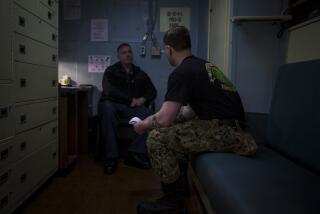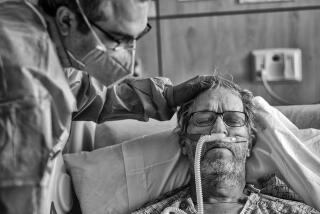Chaplain Bowed Out as Commander of His Own Death
- Share via
A year ago today, Navy Cmdr. Gary E. Tugan was the best man at his son’s wedding.
The photographs show a man of 50, erect, beaming, proud as hell, with a radical Marine-style buzz cut--his way of beating the indignity of hair lost to radiation therapy.
“We danced at the wedding and had a good time,” says Marilouise Tugan, his wife. “The only problem came when he was supposed to give a toast. He asked me what that meant. I told him it’s when people hold up their glasses and say nice things. He did fine. For a man who wasn’t supposed to be alive, he did great.”
Marilouise laughs, full-hearted, with nothing held back. She is 43, a college administrator and mother of six--hers, his, and all of them theirs.
Now tears are pooling in the corners of her eyes. Mascara is already smeared on her cheeks, the tracks of emotion spilled in pain, joy and relief.
We have been talking for hours, sitting in the living room of the Tugan family home on the grounds of El Toro Marine Corps Air Station, where Gary was a Navy chaplain. Gary’s son, Air Force 1st Lt. Gary B. Tugan, an aerospace engineer in Los Angeles, is on the couch with his wife, Eileen.
He’s laughing too, recalling his father’s reference to Eileen in the toast as his favorite among his son’s girlfriends. And what if she hadn’t been his favorite?
The faces of daughters Heather Wessner, 20, and Kim Tugan, 14, light up with the recollections of other good laughs too. During those final days.
Remember when no one could figure out that he really meant Indians instead of onions ? they say. Or when he said that there was a tree growing out of his toes? Or when-- typical Gary --he let them know that he was bemused yet resigned to the shock of Heather’s neon-green sweater? By then the tumor had robbed him of his ability to say exactly what he meant.
And then, even closer to the end, there was the time when he stuck out his tongue--just as a child might say yuk! at the prospect of lima beans--when he caught sight of the hospital bed that was, finally, brought into their home.
The family put it right here, in the living room, the center of life in this house.
Gary died in that bed exactly a week later, on July 3, when his brain tumor finally shut his body down. He was just 51 years old.
Yet Gary Tugan left the world as he had hoped, in the arms of his family, without chemotherapy or high-tech machinery, or even as much as an intervenous feeding tube. The last words he heard were those of his wife, his mother, his sons and daughters, telling him why he was so loved.
“Then I said, ‘You need to be where you can run and sing.’ ” Marilouise says, her face crumpling in tears. “And that is when his heart stopped. It had never stopped before. And we all just held on and we cried.”
These days others, of course, are dying their own way, according to plan. Some with more fanfare than we expect.
Douglas and Dana Ridenour, in their 40s and in apparent good health, sealed their death pact on video before killing themselves at their Anaheim home last month. They were apparently afraid of what they saw as life’s inevitable decline.
One county woman, 36, wrote after reading my column on that murder-suicide to tell me that she and her husband, who have no children, might eventually do the same. She’ll begin assessing the best time, she says, when she turns 50 years old.
“It only makes sense that when we get older and find one of us is in ill health (be it cancer or Alzheimer’s) or there is the fear that we ‘might’ not grow old gracefully, we should make the final determination as to whether or not we want to continue,” this woman wrote.
“Maybe some of your readers think there’s nothing wrong with rotting away in a nursing home, but we certainly do. And, because my husband and I love each other so much, we would want to go together.”
But unlike so many others, Gary Tugan’s death, with dignity and on his terms, bequeathed to his family a deep understanding of just what life, and love, can really mean.
Their trek through confusion--military doctors kept telling them they could find nothing wrong--then doubt, anger, promise and fear, finally led them to accept his death with a soft-edged certainty that they were doing what was right.
Marilouise says it was a chance encounter in a hospital emergency room with Dr. Robert Wayner, a Laguna Hills neurosurgeon who treated Gary for a seizure earlier this year, that made her realize that there was no real emergency left.
After surgery at a San Diego military hospital last year, medication, at that point, was keeping Gary alive.
But rather than increase the dosage, and the side effects, as the tumor enlarged, the couple decided that the quality of their time together was more important than a gamble on simply more days in bed. Gary worked almost up to the time of his death.
“I told her it was not unreasonable, unholy or unethical for her not to increase the medication,” Wayner says. “I’ve seen too many people die of brain tumors, so I have strong feeling about this. . . . I believe it is better to let the disease hurt the person rather than the treatment hurt them more. . . .
“I told her we are not in control of everything, that she could relax with the fact that she had done everything she could. Beyond that, we might as well not fight it.”
So barely a month after his death, those that Gary Tugan left behind still ache for his laughter and his warmth, yet when they recall the moments that presaged his passing, they are filled with hope.
He enriched many lives, leaving inspiration in his wake.
One chaplain at the El Toro base was attending a funeral at the exact time of Gary’s death, when a feeling of serenity suddenly overcame him. He turned to his wife to tell her and she said, “You felt it too?”
Another close friend, also a base chaplain, was on a camping trip when Gary died. That night, he says, in a dream, an angel told him that Gary had died and that he had been filled with peace.
The chaplain awoke after that to splash his face with water, convinced that his friend’s illness was simply weighing heavily on his mind. Later, when a park ranger found him to relay the news from Marilouise that Gary was gone, he returned and told Marilouise about his dream.
“And that, to me, answered the only question that I had had,” Marilouise says. “The only thing I had been unsure of was whether he had been in pain. . . .
“So as sad as it was, it was positive,” she says. “It was a gentle death, and what more can you ask but to die gently? I am so proud of these children, and I still am, the way they took responsibility, the care and the tenderness. What else is a family?”
Gary Tugan, a minister in the United Church of Christ and a highly decorated military man, was buried with full honors in Arlington National Cemetery. He, and his family, are heroes in many, many eyes.
More to Read
Sign up for Essential California
The most important California stories and recommendations in your inbox every morning.
You may occasionally receive promotional content from the Los Angeles Times.













